2019 浙江省舟山市中考英语真题及答案
卷一
一、听力(本题有15小题,第一节每小题1分,第二、三节每小题2分,共计25
分)
第一节:听小对话,从A、B、C三个选项中选出正确的选项,回答问题。
1. What will the weather be like this afternoon?
A. Rainy.
B. Sunny.
C. Windy.
2.Whose is the bike?
A. Tony's.
B. Lily’s
C. Sara’
s
3.How often does the girl go to the gym?
A. Once a week.
B. Twice a week.
C. Three
times a week.
4.What was the matter with Tina?
A. She had a cold.
B. She had a fever.
C.
She
had a stomachache.
5.What's the probable relationship between the two speakers?
A. Waiter and customer.
B. Guide and tourist.
C.
Student and teacher.
第二节:听长对话,从A、B、C三个选项中选出正确的选项,回答问题。
听下面一段较长对话,回答第6—7两个问题。
6.Where did John lose his bag?
A. In the cinema.
B. In the bookstore.
C.
In the supermarket.
7.What color is John's bag?
A. Black.
B. Brown.
C. Green.
听下面一段较长对话,回答第8—10三个问题。
8.When is Mike going to the countryside?
A. On Friday.
B. On Saturday.
C. On Sunday.
9.Who is going to the mountains with Mike?
A. His grandpa.
B. His uncle.
C.
His
cousin.
10.What does Mike advise Jessica to do?
A. To take a walk.
B. To watch a movie.
C. To go
�
to a concert.
第三节:听下面一段独白,从A、B、C三个选项中选择正确的选项,回答
问题。
11. How did the boy go to the zoo?
A. By car
B. By bus.
C. By bike.
12.Which animals did the boy see first?
A. Tigers.
B. Elephants.
C.
Monkeys.
13.What made the boy feel a little afraid?
A. Watching the tigers.
B. Feeding the elephants.
C. Playing with the monkeys.
14.What were the monkeys eating?
A. Apples.
B. Bananas.
C. Pears.
15.What did the boy think of the trip?
A. Boring.
B. Interesting.
C.
Surprising
二、完形填空(本题有 15 小题,每小题 1 分,共计 15 分)
阅读下面短文,然后从各题所给的四个选项中选出一个最佳答案。
Last summer my son, Eric, left for university in another country.
Our once lively house became quiet and
16
. I missed him so much
that I started sending him messages on the phone, mainly to say
17
or to give him a word of warning.
One of my messages says, "So you told me you
18
your credit
card(信用卡). If you don't try hard to mend your careless ways, one day
you'll
19
and find your brain missing."
I did get Eric's messages, but most of them were about
20
. They
were no different from the notes he used to leave
21
the white board
when he was at home.
"I bought a new pair of shoes. They cost me $90. Please help!"
�
"Money is running short
22
I've bought some books for my
research paper. Help me please!"
23
, however, Eric begins to send me all kinds of articles: some
funny, some touching and some worth
24
. He says they will help me
understand young men better and keep up with the times.
I read the articles slowly, like a
25
student, with mixed
feelings as well—my kid, who followed me around not long ago, has now
become my
26
.
So I write back. "I've read all those articles. I'll take
27
as
a loving son's expectations towards his mother. He must be thinking that
his mother is still
28
enough to accept new things. That makes me
feel proud. What we parents lack(缺乏) most is the ability to learn and
29
, in both body and mind. Thank you, my son."
In this way we share ideas and
30
each other, with a gentle and
beautiful language we seldom use. Every time I read those messages, I
feel my heart filled with warmth.
16. A. dark
B. clean
C. lonely
D.
comfortable
17. A. hello
B. sorry
C. thanks
D.
goodbye
18. A. lost
B. lent
C designed
D. received
19. A. give up
B. wake up
C. set off
D. take off
20. A. health
B. music
C. money
D.
safety
21. A. on
B. across
C. behind
D. opposite
22. A. if
because
B. until
C. though
D.
�
23. A. Luckily
B. Actually
C. Recently
D. Immediately
24. A. copying
B. writing
C. thinking
D. correcting
25. A. crazy
B. popular
C. nervous
D. careful
26. A. doctor
B. teacher
C. customer
D. classmate
27. A. us
B. you
C. him
D. them
28. A. young
B. pretty
C. friendly
D.
honest
29. A. fight
B. change
C. exercise
D. remember
30. A. watch
B. invite
C. protect
D.
encourage
三、阅读理解(本题有 15 小题,每小题 2 分,共计 30 分)
阅读下面四篇材料,然后从各题所给的四个选项中选出一个最佳答案。
A
Every year, more than 26,000 children arrive in Britain. We ask some
new arrivals what they like best about their new lives and what's
different from home.
Jarek, Poland
Daisy&Luck, the USA
I don't know anybody from Poland
here,but I'm lucky because the
English boy next door is very
friendly and kind. We are in the
My sister and I like
same class! I like teachers here. At home, the
teachers seem a bit strict and serious. There
are a lot of rules, too. Here, teachers are
patient and don't give much homework. We
students go out of school and buy pizza or
burgers at lunchtime. We can't do that in
Poland.
Zinah, India
living here. It's cool!
My
sister
loves
the
British accent( 口 音 ).
Everybody here is very
polite.
But
we
don't
understand
all
your
strange words — we say
"yard" not "garden",and
�
It's too cold here! I hate doing
"apartment" not "flat".
sports, especially outside in
The food is better here.
winter. The teacher here is very
There's Chinese, Indian
serious about sports. I prefer
and Thai. At home we eat
science and maths. I love the maths class
too much fast food.
because the teacher is really funny, just like
my maths teacher in India. The school is so
big and some students seem unfriendly. I'm
from a small village school. I think it's hard
to communicate with them.
31. Among the above four children, ________ probably likes the new school
life best.
A. Luck
B. Zinah
C. Jarek
D. Daisy
32. In Zinah's eyes, her maths teacher in India might be ________.
A. cold
humorous
B. strict
C patient
D.
33. The passage is probably taken from ________.
A. a travel magazine
B. an education website
C. a geography textbook
D. a business newspaper
B
Everyone faces difficulties in their life. Daniel Kish was
born with a special eye illness and lost his eyesight before
he was only 14 months old.
Soon after, however, he started to do an amazing thing. He
learned to make clicks(咔哒声) with his tongue to help him move around.
Kish now moves about using sonar(声呐). He is so good at it that he can
ride a bicycle by himself on public roads. And he started the
organization World Access for the Blind(WAFTB) in 2000, teaching others
how to use sonar. In the interview with National Geographic, he explains
how the sonar works.
"When I make a click sound, it produces sound waves. These waves
reflect(反射) off surfaces all around and return to my ears. My brain
then deals with the sound and turns it into pictures in my mind. Each
click is like a camera flash, which helps me make a 3-D picture of my
�
surroundings for hundreds of feet. It's like having a conversation with
the environment."
Kish feels it is exciting to ride a bike using a sonar, although
he needs to click twice a second, much more than he usually does. "It
may sound a bit dangerous to move around the world in this way," he says.
"But most people in the world live in fear of things that they imagine.
I love hiking and mountain-biking. I go almost everywhere. And I've never
had an accident and hurt myself."
He is happy to be able to help more blind children to improve their
life. "We've served over 10, 000 students in nearly 40 countries," he
tells the reporter. "Many students are surprised how quickly results
come. Seeing isn't in the eyes. It's in the mind."
34. Kish moves around using sonar because ____.
A. he is good at making clicks
B. it make him "see" the world
C. he has a great interest in science
D. it is important
for him to keep healthy
35. Which of the following is the right order shoeing the sonar works?
①The sound waves reflect off surfaces.
②The person makes a clicking sound.
③The brain turns the sound into pictures.
④The sound waves reach the person's ears.
A. ①④③②
B. ②①④③
C. ①④②③
D. ②③①④
36. What can we learn about World Access for the Blind( WAFTB ) from
the passage?
A. It offers the blind free bicycles.
B. It sells sonar
products to the blind.
C. It teaches the blind to use sonar .
D. It helps the blind find
more friends.
37. The best title for the passage might be ____.
A. Living without fear
B. Travelling with the blind
C. Hoping for the future
D. Looking around the world
C
Fresh green grass. Hundreds of colorful wild flowers. Water running
into little pools. Birds making their homes in boxes. The 9,
�
500-square-metre Augustenborg Botanical Garden may look just like any
other well-organized park but there's a difference. It lies on the
roofs(屋顶) of industrial and office buildings in the city of Malmo in
Sweden.
Green roofs are not a new invention. And now they are getting popular
again. The common roofs of a modem city have endless black surfaces with
no life or water. Perhaps that's why a garden on a roof becomes such
a perfect choice for more and more people.
Green roofs are not just pretty. They also help to moderate the city
temperature. The high temperatures on common roofs in the summer can
make top floor flats uncomfortably hot. What is more, they play a part
in making the cities hotter than the countryside around them, causing
the "urban heat-island effect". On a green roof, however, with its plants
and water, temperatures change only a little, as they do in a park. This
can greatly cut the costs of heating and cooling in the building below.
Also, a green roof takes in rain water, and protects the city
drainage(排水) system. ________ And small animals and birds can make
their homes on it. Thanks to this, the city may become part of nature,
rather than something completely separate from it.
While the cost of building such a roof can still be higher, it can
be cheaper in the long term as a result of energy savings. And wouldn't
it be wonderful to be able to walk out into a garden high above the city's
noise and traffic, whether you're at school or in an office or just at
home in a ten-floor block.
38. With the example of Augustenborg Botanical Garden, the writer wants
to explain ______.
A. how wildlife is protected
B. what a green roof is like
C. how to organize a good park
D. what to do with a spare roof
39. The underlined word "moderate" in Paragraph 3 is the closest in
meaning to "______".
A. raise
control
B. check
C. record
D.
40. Which of the following is the best sentence to fill in the blank
in Paragraph 4?
�
A. A green roof is alive
B. A green roof stops
pollution
C. A common roof is noisy
D. A common roof increases the
cost
41. The purpose of the passage is to ______.
A. discover the problems with green roofs
B. introduce the change of green roofs
C. show the amazing beauty of green roofs
D. describe the advantages of green roots
D
Mark Zuckerberg, who starts the social network Facebook, often wears
jeans and a T-shirt to work, including to important business meetings.
Not everyone agrees with him. Some people say he doesn't look serious
this way.
Harvard Business School researcher, Francesca Gino, has a different
idea. While most people seem to think that dressing differently from
those around you generally has a bad influence, she believes it can
actually have a positive(积极的) effect. And she's done experiments to
support her idea. When her researchers, wearing sportswear, visited the
expensive shops an Italy, they were usually viewed as wealthier and more
important people than those who were well-dressed in designer clothes.
Do people always view less formal(正式的) clothing more positively?
Researchers in France took their research out into the street, to the
general public. The video they made shows an actor dressed in a well-cut
suit and shiny shoes. While walking along the road, he begins to cough
badly, stops to catch his breath and falls down. Before he even calls
for help, people rush to help him. In another video, the actor appears
at the same crowded place and repeats the actions in exactly the same
way. But this time, no one comes to help. What's the difference? He's
wearing untidy clothes and looks like a homeless person. In a situation
like this, the clothes you're wearing could mean the difference between
life and death.
It seems that our clothing doesn't only change the way others view
us, but also the way we see ourselves. In an experiment testing students'
�
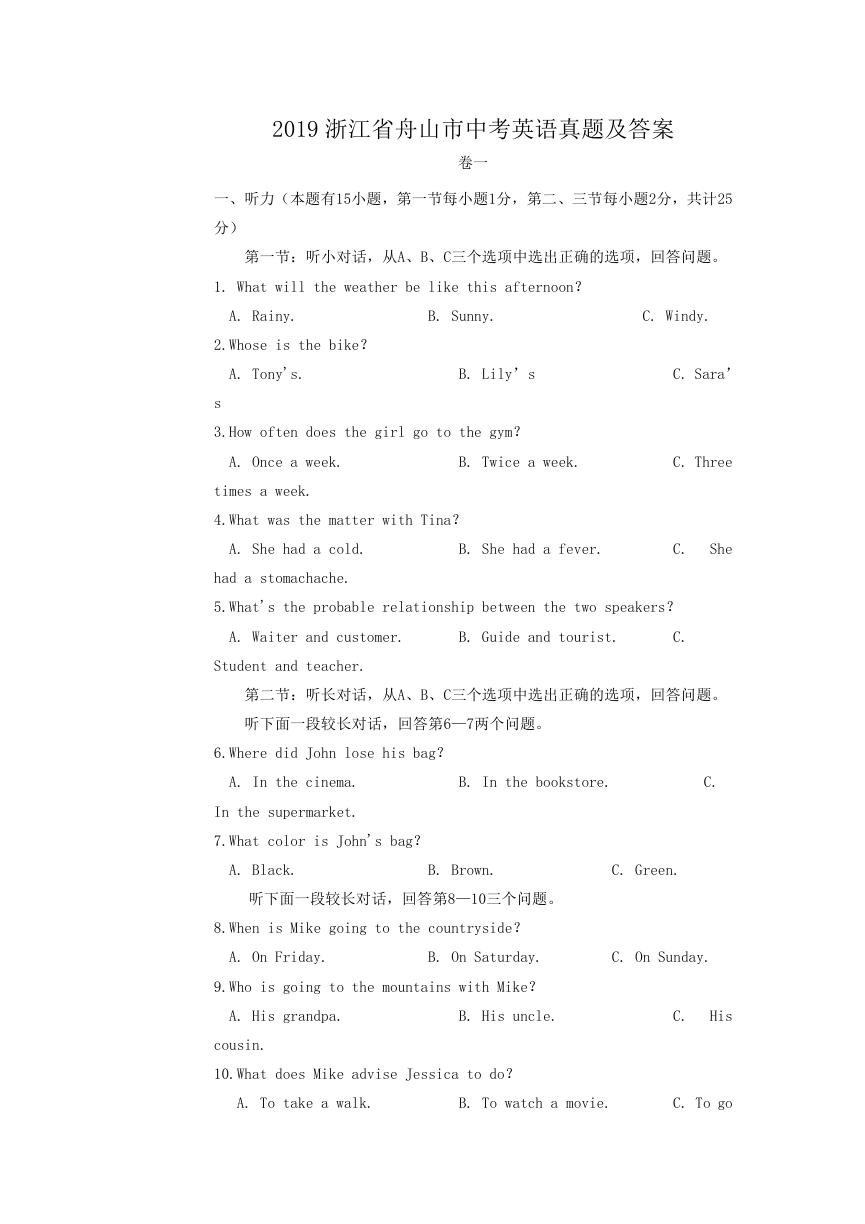
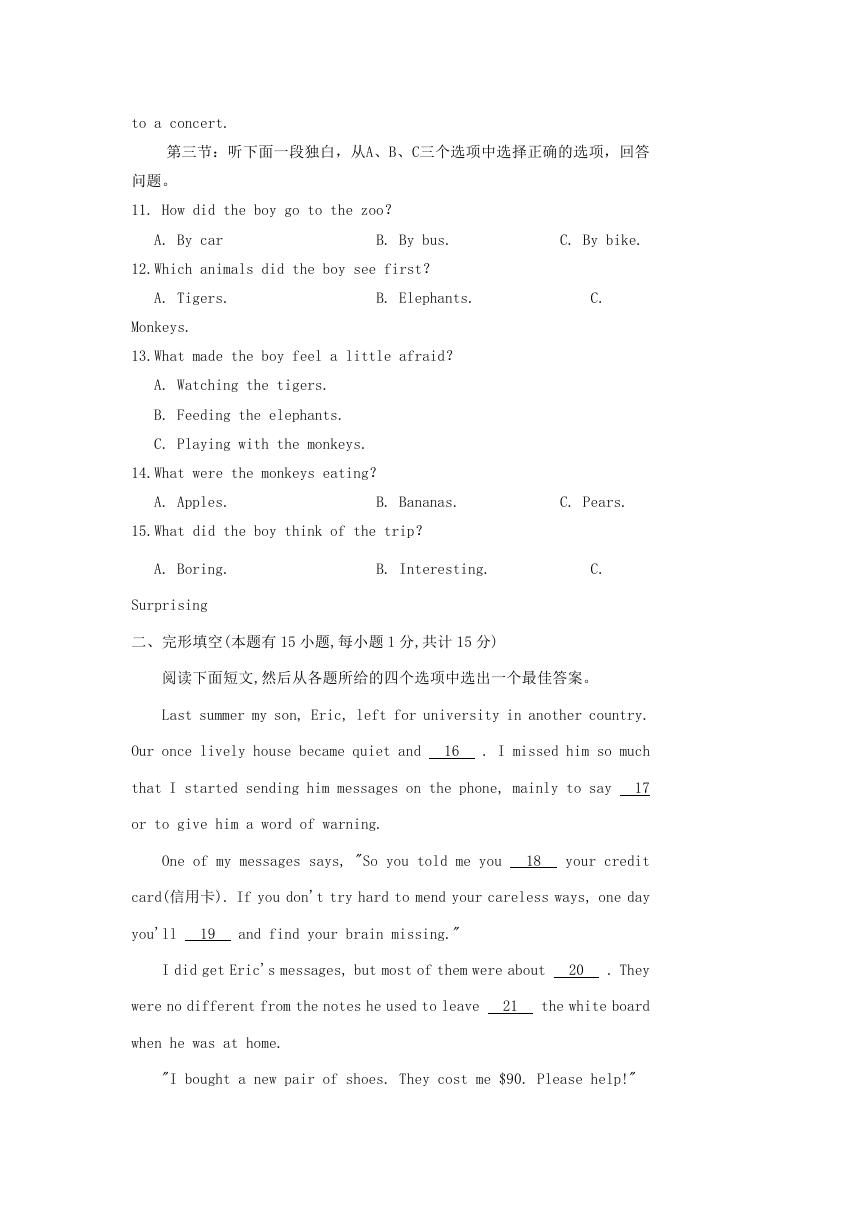
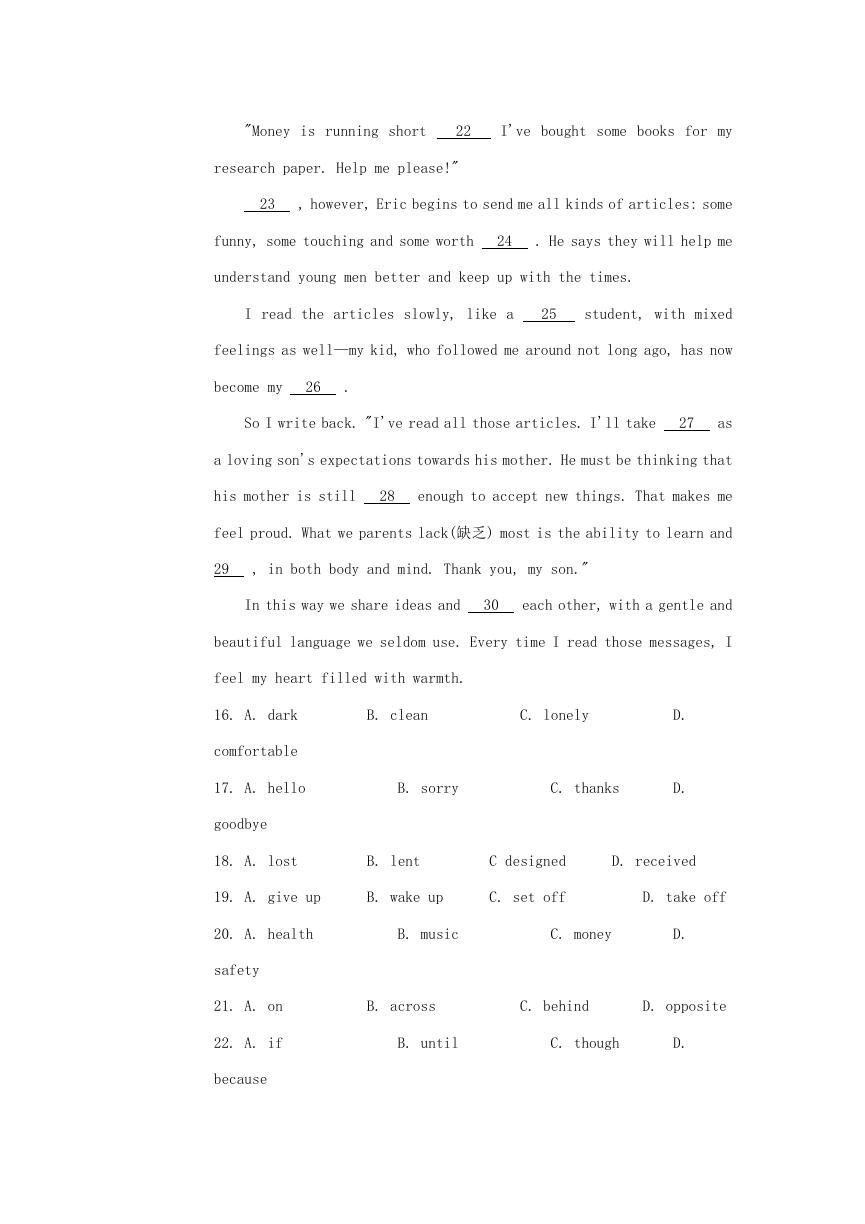
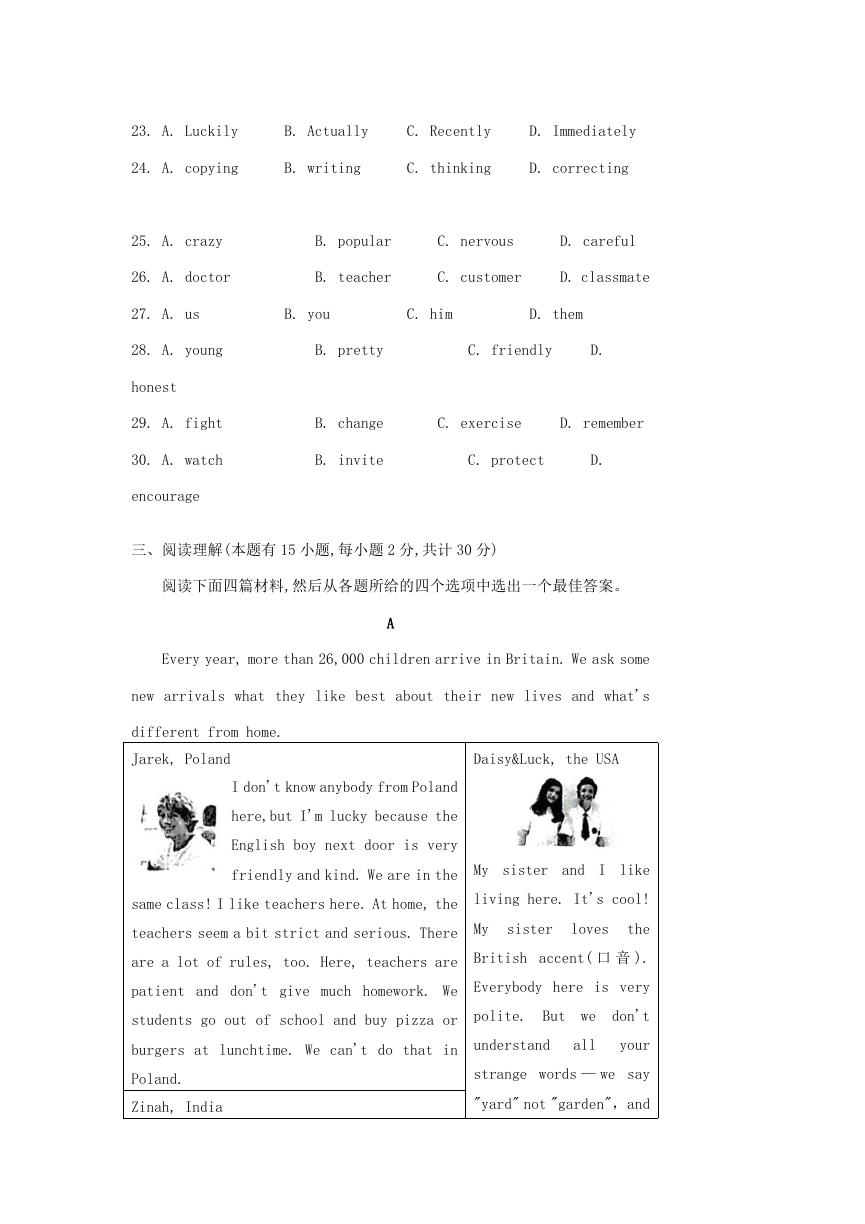
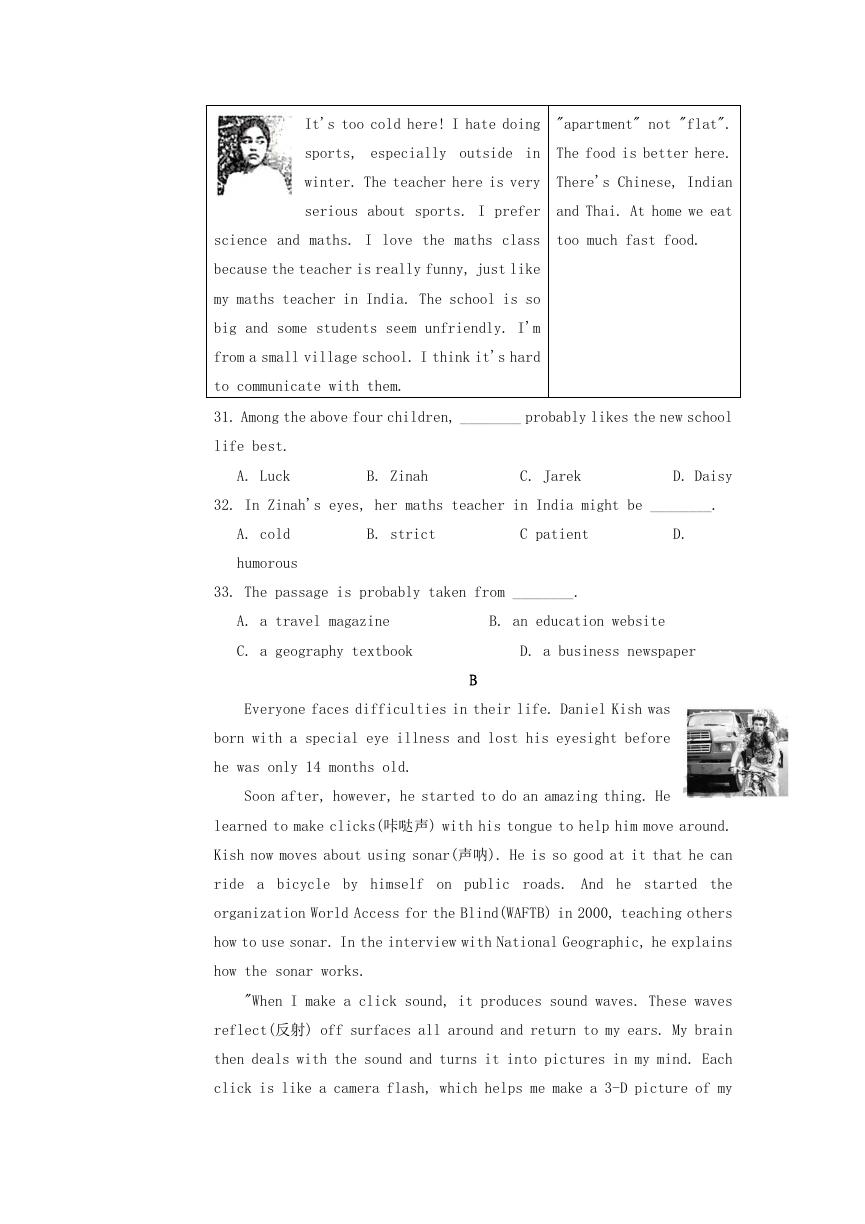
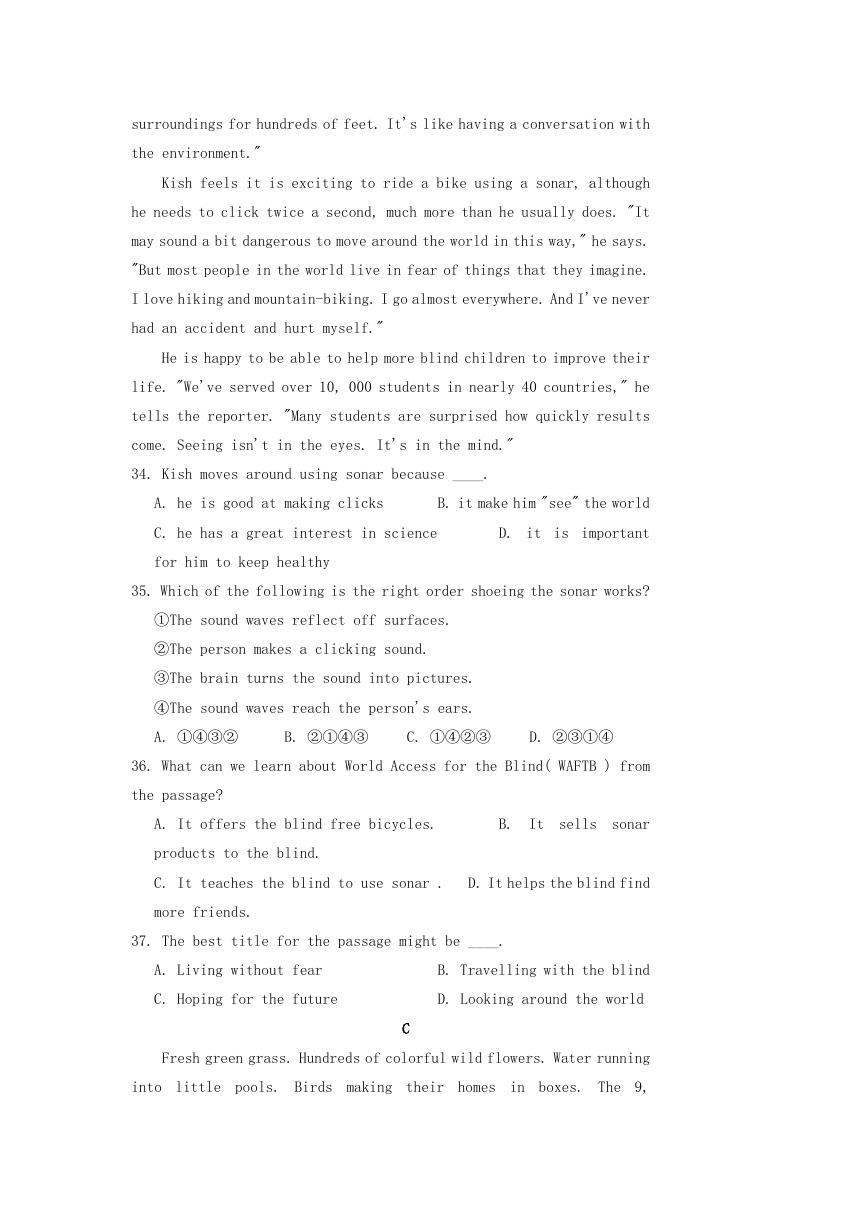
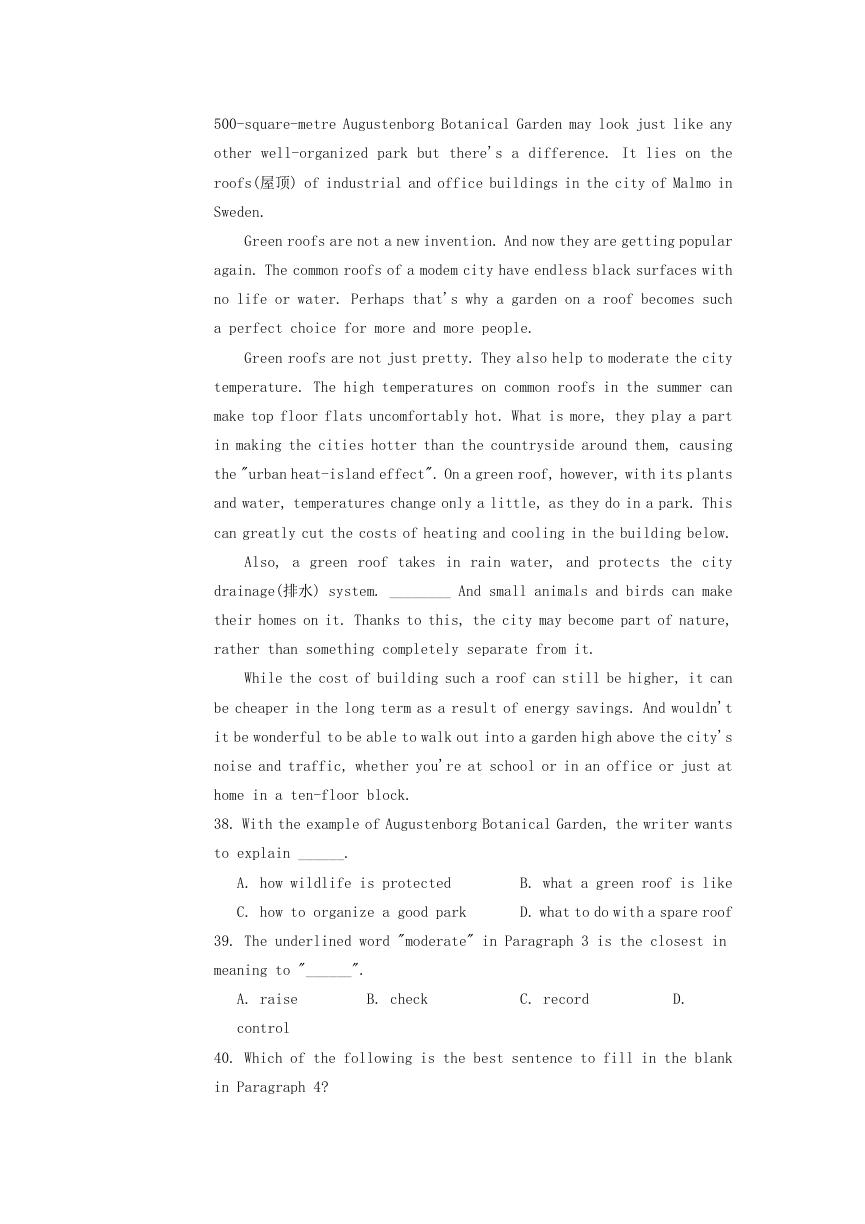
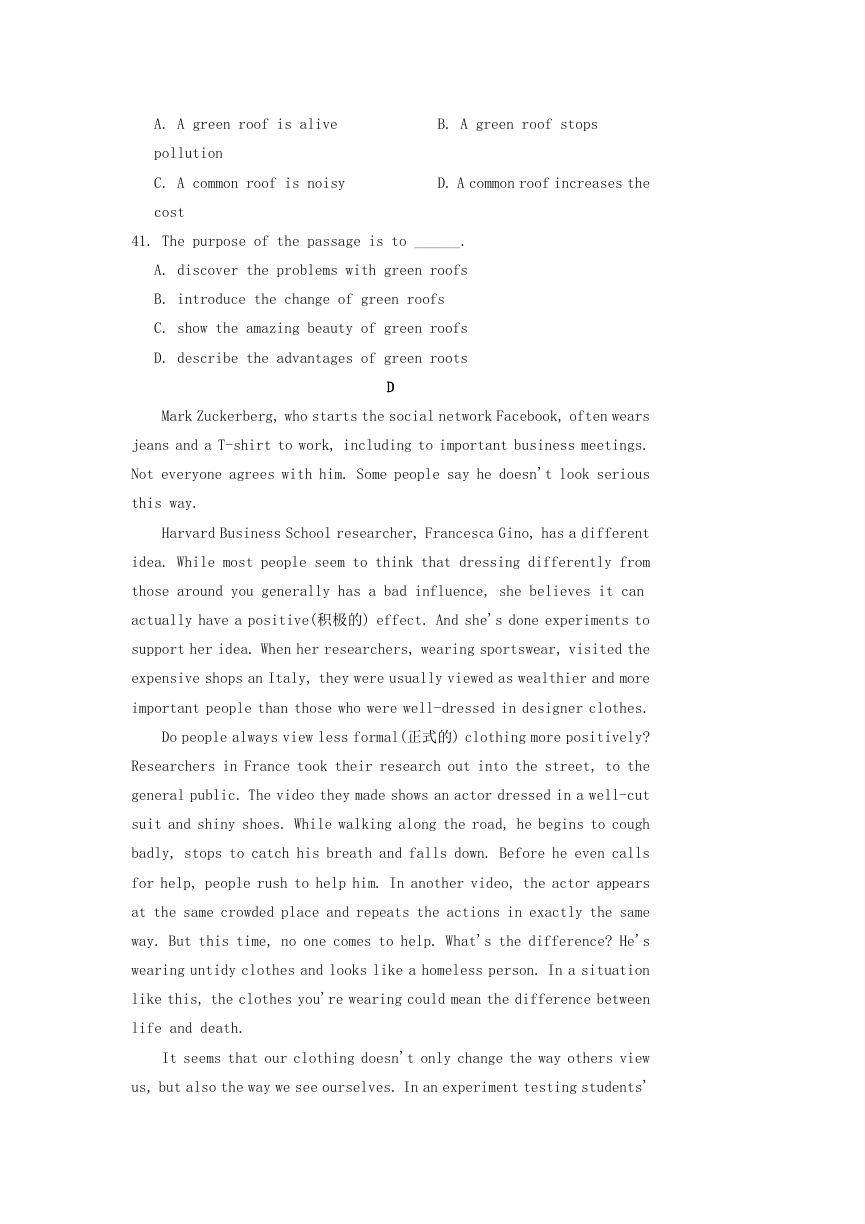








 2023年江西萍乡中考道德与法治真题及答案.doc
2023年江西萍乡中考道德与法治真题及答案.doc 2012年重庆南川中考生物真题及答案.doc
2012年重庆南川中考生物真题及答案.doc 2013年江西师范大学地理学综合及文艺理论基础考研真题.doc
2013年江西师范大学地理学综合及文艺理论基础考研真题.doc 2020年四川甘孜小升初语文真题及答案I卷.doc
2020年四川甘孜小升初语文真题及答案I卷.doc 2020年注册岩土工程师专业基础考试真题及答案.doc
2020年注册岩土工程师专业基础考试真题及答案.doc 2023-2024学年福建省厦门市九年级上学期数学月考试题及答案.doc
2023-2024学年福建省厦门市九年级上学期数学月考试题及答案.doc 2021-2022学年辽宁省沈阳市大东区九年级上学期语文期末试题及答案.doc
2021-2022学年辽宁省沈阳市大东区九年级上学期语文期末试题及答案.doc 2022-2023学年北京东城区初三第一学期物理期末试卷及答案.doc
2022-2023学年北京东城区初三第一学期物理期末试卷及答案.doc 2018上半年江西教师资格初中地理学科知识与教学能力真题及答案.doc
2018上半年江西教师资格初中地理学科知识与教学能力真题及答案.doc 2012年河北国家公务员申论考试真题及答案-省级.doc
2012年河北国家公务员申论考试真题及答案-省级.doc 2020-2021学年江苏省扬州市江都区邵樊片九年级上学期数学第一次质量检测试题及答案.doc
2020-2021学年江苏省扬州市江都区邵樊片九年级上学期数学第一次质量检测试题及答案.doc 2022下半年黑龙江教师资格证中学综合素质真题及答案.doc
2022下半年黑龙江教师资格证中学综合素质真题及答案.doc